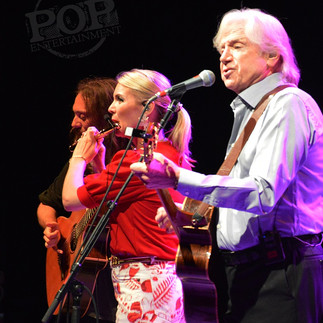
Christopher Cross & Justin Hayward – Keswick Theatre – Glenside, PA – July 10, 2024
It seems almost a slightly weird lineup to put Christopher Cross and Justin Hayward on the same bill. However, this is the second straight year that the two have played the Keswick together, so something must be working right.
Cross is the early 1980s superstar whose debut self-titled album was a cultural phenomenon. Christopher Cross featured four top-40 hits: “Ride Like the Wind,” “Sailing,” “Never Be the Same,” and “Say You’ll Be Mine.” It also won Cross six Grammys, including “Song of The Year,” “Record of the Year” and “Best New Artist.” Cross followed up that album with quite possibly his biggest hit, the movie soundtrack song “Arthur’s Theme (The Best That You Can Do).” By the time his second album Another Page was released in 1983, he still had three top 40 hits: “All Right,” “No Time For Talk” and “Think of Laura.” However, the album sales were disappointing, and the writing was on the wall – he would never have another top 40 hit. Still, over the years he has been a popular touring artist, getting even more so in recent years.
Unlike the quick but explosive career of Cross, Justin Hayward was much more of a slow and steady win the day type of career. Hayward was the lead vocalist for The Moody Blues – an early prog rock band from the 1960s who ratcheted up the rock in the 1970s and eventually polished up their pop sound by the 1980s. Hayward joined the band for their second album, and sang on multiple hit singles from 1968 to 1988 – including “Nights In White Satin,” “Tuesday Afternoon,” “I’m Just A Singer in a Rock and Roll Band,” “Question,” “Gemini Dream,” “The Voice,” “Your Wildest Dreams” and “I Know You’re Out There Somewhere.”
Both very good, important musical careers, but somewhat different musically. Still, they worked surprisingly well together.

The opening act for the show was guitarist Mike Dawes, a unique player who showed how he could make an acoustic guitar sound like all sorts of other instruments, including a bass and a drum. Dawes did three technically proficient instrumental tunes, an eclectic original called “Boogie Shred,” and then tasteful covers of Van Halen’s “Jump,” and Gotye’s “Someone That I Used To Know.”
As Dawes started into his fourth tune, you couldn’t help but notice how much it sounded like The Moody Blues’ “Tuesday Afternoon.” Dawes continued playing as, without a pause, Justin Hayward’s band joined him, sliding seamlessly into the show’s second act with no delay. First up was former Moody Blues’ keyboardist Julie Ragins (she was with the touring band for the last 12 years that they toured from 2006 to 2018), who nailed the song’s distinctive piano line. Then multi-instrumentalist Karmen Gould (she mostly played flutes, recorders, woodwinds and tambourine) joined the song. Then, finally Hayward stepped in the slide zone and to the mike to recapture the angelic vocals that he had originally laid down about 56 years earlier.
In general, Hayward’s performances tend to be more acoustically based than his old days with the Moodies, although a few times Dawes pulled out an electric guitar to accompany some songs. Therefore, old standbys like “The Voice” and “Forever Autumn” (a Hayward solo track from the 1970s favorite Jeff Wayne rock opera War of the Worlds) lose a lot of the expansive majesty of the original studio versions, but at the same time they do gain a bit of intimacy.

Hayward dipped liberally into both his old band’s songbook and his own solo work. In fact, at one point he did a five-song medley of obscurities that even Hayward acknowledged was a strange grouping of songs, but one that he has used for years for practice that at some point he decided to just add to the setlist.
Of course, people were there for the hits, and they came out in strength as Hayward stormed towards the encore. First, he did a wistful version of his last truly huge Moody Blue’s hit – the melancholic 1986 pop love song “Your Wildest Dreams,” which still had a sweet innocence and propulsive catchiness. Then came arguably the wildest performance of night, a rambling and passionate take on the old classic “Question,” a song full of dramatic tempo changes, false endings and some truly shredding guitar.

Then Hayward slowed down for the band’s best-known standard, the majestic psychedelic classic “Nights in White Satin,” which still sounds undeniably gorgeous all these years later.
As his set started, Christopher Cross hit the stage with two of his bigger hits – although ones that may not have stood the test of time quite as well as his three or four standards. First off was the poptastic “All Right,” which still skips along spritely over forty years on from its chart run. And then, doubling down on the pop vibes, he and his band stormed through what is quite possibly my favorite song of Cross’ career, “Never Be the Same,” which is truly gorgeous and deceptively happy sounding with some really sad breakup lyrics.
Travelling with a pretty huge band (nine players including backing vocalists) there was some spectacular musicianship here. Particularly impressive were the jazzy keyboardist Jerry Leonide and saxophonist Andy Suzuki, who both stunned in their spotlight moments. However, everyone in the group sounded tight, including drummer Francis Arnaud, bassist Kevin Reveyrand, and backing vocalists Jewelee Peters, Lisbet Guidback, Julia Sarr and Stephcynie.

Not surprisingly, Cross did a wide cross-section of songs from his classic 1980 debut album, and not just the multiple hits the album spawned. (In fact, he didn’t play the fourth hit single from that album, “Say You’ll Be Mine.”) For example, the sweet and melancholy “I Really Don’t Know Anymore” still feels wonderfully yearning and pained. The sweet and just slightly salty “Minstrel Gigolo” and “The Light is On” also still feel like they would have also been hits in a more just world.
Of course, Cross had more than his share of hits in his heyday. About five songs in he did his all-time classic “Sailing,” which is a sweet and near-perfect view of living with nature. (Sadly, “Sailing” is probably as inadvertently responsible as any song for birthing the obnoxious and patronizing term “yacht rock” into public discourse.)
Two songs later, Cross pulled out his classic movie theme, “Arthur’s Theme (The Best That You Can Do),” which he dedicated to his recently passed old friend and collaborator Burt Bacharach. “Arthur’s Theme” is still a truly gorgeous song (although people still are trying to decode the line “When you get caught between the moon and New York City”) and it sounded grand here, particularly because of Suzuki’s stunning sax solo.
Cross closed things out with his two other biggest hits, the wondrous rock theatrics of “Ride Like the Wind” and then finished with his softly anguished tribute to a friend who had died, “Think of Laura.”
After seeing these two artists in the new millennium, maybe the whole idea of “Never Be the Same” will have to be reexamined.
Jay S. Jacobs
Copyright ©2024 PopEntertainment.com. All rights reserved. Posted: July 13, 2024.
Photos by George Seth Wagner © 2024. All rights reserved.
























































Comments